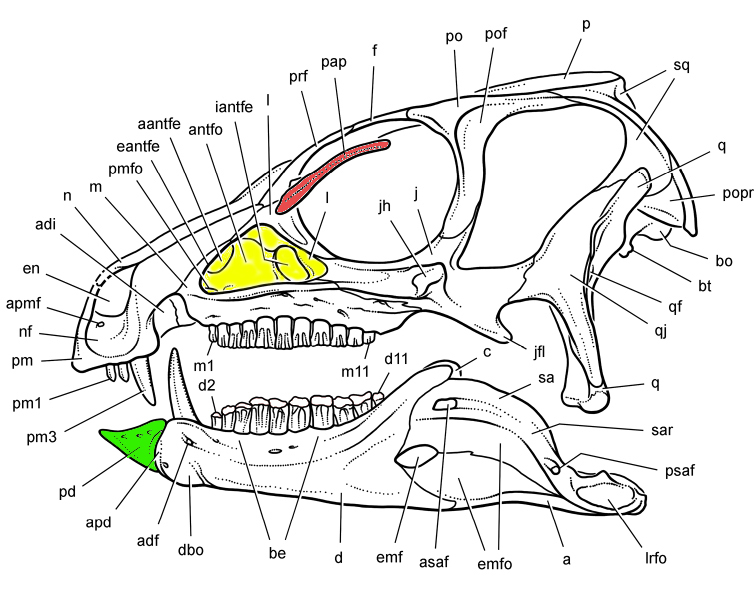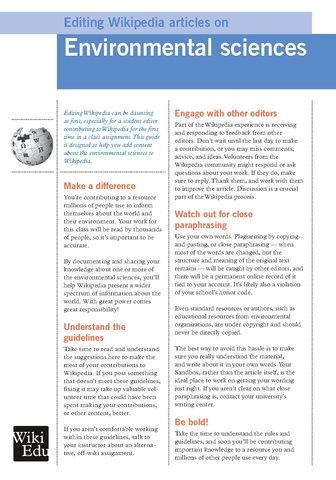Highlights
- May essentially marks the completion of the spring 2016 term, and with it, our first term in the Year of Science. The Classroom Program had its best term yet, with 215 courses contributing 3.5 million words. Of those, 116 were Year of Science participants. Those courses contributed 2 million words to Wikipedia. An analysis of student contributions for April 2016 revealed that Wiki Education Foundation students were responsible for 6% of all science contributions to Wikipedia that month.
- Wiki Ed published a new guidebook for students editing in articles in the environmental sciences. The guidebook explores topics related to writing about conservation efforts, campaigns and environmental organizations. It was written with input from experienced Wikipedians and instructors, and will be sent to environmental science courses starting in the fall 2016 term.
- We’ve expanded our Dashboard to accommodate a variety of Wikimedia sister projects, including additional language editions of Wikipedia. This is part of an effort, supported financially by the Wikimedia Foundation, to add flexibility to our Dashboard to be adapted to international use.
Programs
Educational Partnerships & Outreach
In May, Outreach Manager Samantha Erickson and Educational Partnerships Manager Jami Mathewson visited San Francisco State University. While there, they met with the Paul K. Longmore Institute on Disability to investigate collaborations that will improve Wikipedia’s coverage and representation of disabilities. Wiki Ed presented to faculty, primarily who teach composition courses, about the Classroom Program and its value to students.
Samantha spent the month helping instructors develop assignment plans for their summer and fall 2016 courses. She also experimented with virtual outreach, joining faculty at Georgetown University and Northern Illinois University for webinars and video calls to introduce them to the benefits of joining the Classroom Program. At Northern Illinois, the women’s studies department is eager to participate in the National Women’s Studies Association initiative to improve Wikipedia’s coverage of women and women’s studies.
The team spent May finalizing and coordinating Wiki Ed’s presence at various conferences this summer. Wiki Ed plans to attend the following meetings to promote the Year of Science ahead of the fall 2016 term:
- Festival of Learning (June 7, Burnaby, British Columbia)
- American Astronomical Society (June 12—16, San Diego, California)
- Wikimedia Diversity Conference (June 17–18, Washington, DC)
- American Society of Plant Biologists (July 9–13, Austin, Texas)
- Genetics Society of America (July 13–17, Orlando, Florida)
- American Statistical Association (July 30–August 4, Chicago, Illinois)
- Botanical Society of America (July 30–August 3, Savannah, Georgia)
- Mathematical Association of America (August 3–6, Columbus, Ohio)
- Ecological Society of America (August 7–12, Fort Lauderdale, Fort Lauderdale)
Now that the spring 2016 has mostly wrapped up, we’re excited to report that students participating in the Classroom Program through educational partnerships have expanded or created 2,615 articles on Wikipedia.
Classroom Program
Status of the Classroom Program for spring 2016 in numbers, as of May 31:
- 215 Wiki Ed-supported courses were in progress (93, or 43%, were led by returning instructors)
- 4,137 student editors were enrolled
- 46% were up-to-date with the student training
- Students edited 4,620 articles and created 489 new entries.
The majority of our courses have finished their Wikipedia assignments, and already Spring 2016 term is our most successful to date. This term, we’ve supported our largest number of courses, 215, with our largest number of participating students (4,137). They’ve contributed over 3.5 million words to Wikipedia.
The Classroom Program has scaled significantly, from 162 courses in fall 2015 and 117 in spring 2015 to the current 215. That’s been achieved without expanding our staff or compromising the quality of student contributions. That’s possible because of digital tools such as our the course Dashboard and our online student training, but also through the close coordination between Classroom Program Manager Helaine Blumenthal and Wikipedia Content Experts Adam Hyland and Ian Ramjohn.
For the first time, we’ve distributed an instructor survey through the course Dashboard. Instructors are now invited to complete their survey based on the specific dates of their course. They also answer questions tailored to their course’s subject, size, and other factors. Survey results are still being collected.
The Wikipedia Year of Science is going strong! As of May 31, the 116 Year of Science courses have contributed more than 2 million words to Wikipedia. These courses and students made up over half of our Spring 2016 cohort, and they worked on subjects ranging from the sociology of women and crime to biogeochemistry and from endangered languages to dinosaur science. The Year of Science continues over the summer and through the Fall 2016 term.
As of May 31, we are supporting 16 summer courses and using this quieter time to gear up for fall.
Student work highlights:
- Students in Alex Session’s Stable Isotope Biogeochemistry created a massive 20,000-word article on hydrogen isotope biogeochemistry, which plays an important role in understanding biological, geological, and chemical processes in the environment. In addition, they have expanded the geobiology article from a short overview into a fairly comprehensive account of that field of knowledge.
- Mary Bernheim discovered monoamine oxidase and joined the faculty of Duke University in 1930, at a time when women were a rarity among research scientists. Despite her pioneering work and the importance of her discovery, her Wikipedia biography was just a short four sentences in late April. That’s when a student in Dr. Heather Tienson’s Chem 153A Honors class began working on it. The student expanded it substantially, adding information about the importance of the discovery, and adding additional information about her career at Duke Medical School. Two students in the class made substantial improvements to articles on the enzymespyruvate kinase and caspase 1, while a fourth expanded the metabolic pathway, a short article considering its centrality as a topic.
- Technology that captures and isolates the carbon released from power plants and cement factories are an important aspect of reducing carbon dioxide emissions. Marjorie Went’s Carbon Capture and Sequestration class substantially expanded articles on technologies such as Calcium looping, amine gas treating and membrane gas separation. Students created new articles on ionic liquids in carbon capture and integrated gasification combined cycle, a process for converting coal to syngas, which allows carbon to be removed before combustion.
- Students in Julian Fulton’s ENVS 110 class have been doing good work on topics primarily related to California’s water and protected areas. Water-related articles created by students include theSustainable Groundwater Management Act, Water reuse in California, the Water Commission Act of 1913, the Porter-Cologne Water Quality Control Act, and the Woodland Davis Clean Water Agency. They improved existing articles on Isabella Dam, Keswick Dam, California Water Fix and Eco Restore, Yolo Bypass, Lake Berryessa, the Pajaro River, Lake Oroville, California’s Loon Lake, Trinity Dam, thewikipedia:American River, and Bushy Lake.
- Chris Blattman’s Order and Violence students continued their work expanding articles on theories of the state, the impact of colonialism and political violence. Their work began in February, with students selecting articles, many of them large and unwieldy, and proposing changes which not only added information and references, but re-structured the article to be more clear. User:Jp-columbia re-organized the article on warlord, formerly a loosely geographically ordered list of warlords in history to an article that included theory, history and examples. User:Saw2188 and User:Kevinmccarthy25 faced a similar problem in updating and expanding the article on environmental determinism. The students were careful in summarizing a wide and sometimes sharp academic dispute, and the article is much more clear and complete for their efforts. Two students collaborating on ethnic conflict, User:Akm2173 and User:Amannavani, took on a different task: expanding a small article on a vast topic into a clear but comprehensive whole. Almost all of the students worked on large or complex articles and engaged editors before making major changes by proposing them on the talk page. Students drafted in sandboxes for the most part, but transitioned to making small edits and changes live in their articles quickly. It’s hard to think of a class better prepared to tackle the topics they did, and Wikipedia’s coverage of modern political thought on the State is much better off for it.
- Other students added to popular articles. User:Cmhofley in Diana Strassmann’s Feminist Economics and Public Policy course created an article on Women’s education in Iran. Wikipedia already had articles on Higher education in Iran, Women’s rights in Iran, Women in Iran, and the Women’s rights movement in Iran. None of these completely encapsulated the topic, but all had something to say about it. Not only that, they had to merge a smaller, subsidiary topic (Iranian gender restrictions in education) into their newly created article. Working with Content Expert Adam Hyland, the student was able to cover an important topic with the detail and scope necessary without duplicating or forking content, a tough job in any topic area.
- Diana Strassmann’s other students were quite active. User:Mjiang94 tackled a topic which Wikipedia formerly titled “missing women in Asia“. Through their expansion of the article, it now covers the phenomenon and global discussion under the title missing women. Their work to generalize the topic meant that another student article, from a class in 2014 (The University of Utah’s course on Gender and Economic Development in the Third World), Missing women of China could cover the narrower, but important, topic of Amartya Sen’s work and subsequent reassessment/retraction on sex ratios in China without too much overlap.
Community Engagement
It’s been nearly a year since Wiki Ed took on the Visiting Scholars program. Community Engagement Manager Ryan McGrady spent time this month working on surveys, conducting interviews, and gathering data on the initiative.
Ryan attended a SOWING event (Science Outreach Working to Inspire the Next Generation) at the Simons Foundation office to talk about Visiting Scholars and the Wikipedia Year of Science. He has been busy working with several prospective and existing institutional sponsors and Scholars.
Current Scholars are continuing to produce excellent work. Barbara Page at the University of Pittsburgh improved an impressive 42 articles on biomedical topics this month. Gary Greenbaum at George Mason University brought the high-traffic article on President William Howard Taft to Featured Article status. Meanwhile, Gary’s article on the children’s book The Phantom Tollbooth appeared on Wikipedia’s Main Page on May 28 as “Today’s Featured Content”. Current Scholars have added almost 250,000 words to articles that have been viewed 38,000,000 times.
Program Support
Communications
In May, Communications Manager Eryk Salvaggio published a subject-specific student handbook focused on environmental sciences. The guide, “Editing Wikipedia articles on environmental sciences,” offers guidance for student editors creating new articles about groups, organizations, and programs, and environmental concerns. This guide places special emphasis on the careful evaluation of sources. This guide was created with input from Dr. Becky Carmichael, Louisiana State University; Dr. Rosemary J. Redfield, University of British Columbia; Wikipedia User:DASonnenfeld, and our Content Expert in the Sciences, Ian Ramjohn.
Another handbook is underway. Eryk has spent May preparing an update of the Editing guide, this time aimed directly at students in our program. The Wiki Ed edition looks specifically at what students need to know to contribute to Wikipedia during a class assignment. It also integrates our support and online trainings.
A guest post by Dr. Timothy Henningsen, Assistant Professor of English at the College of DuPage, titled, “The Slow, Necessary Death of the Research Paper (And How Wikipedia Can Revive Composition Instruction)” was the most-read post in May. The author suggests that teaching with Wikipedia offers “the same outcomes that a research paper assignment does, with added benefits.”
Blog posts:
- The Roundup: Cold War Science (May 2)
- Monthly Report for March 2016 (May 2)
- The Roundup: Drugs and drug policies (May 9)
- The Roundup: The little things that fuel everything (May 16)
- The slow, necessary death of the research paper (May 17)
- “Taking Action” in composition and communication courses (May 19)
- The Roundup: Deep breaths (May 23)
- Monthly Report for April 2016 (May 23)
- What can Wikipedia assignments do that this adorable pygmy goat can’t? (May 24)
- Wiki Ed discusses women and Wikipedia at Bryn Mawr (May 25)
- Wiki Ed visits Brown, Northeastern Universities (May 26)
- The Year of Science is coming to a conference near you (May 27)
- Announcing our environmental sciences guide for student editors! (May 31)
External media
- Wikipedia in the classroom Ann Little, Historiann, (May 3)
- The Wikipedia Project Leslea Hlusko, The Hlusko Lab, UC Berkeley. (April 21, shared May 13)
- Edit Wikipedia at Plant Biology 2016 Katie Engen, ASPB Plant Science Today (May 13)
- Why You And Your Students Should Work To Improve Wikipedia Nancy Andrews, Mediashift. (May 26)
- OU History of Science Students Write More than Term Papers University of Oklahoma Public Affairs. (May 27)
- The Year of Science is coming to Plant Biology 2016, Katie Engen, ASPB Plant Science Today (May 31)
Digital Infrastructure
In May, Digital Infrastructure efforts were focused on reinforcing the long-term foundations of the Dashboard.
With funding support from Wikimedia Foundation, Product Manager, Digital Services Sage Ross and our technical partners at WINTR improved the Dashboard’s support for cross-language, cross-wiki courses and programs. The Dashboard now tracks editors’ wiki assignments across any Wikimedia project, from Abkhazian Wikipedia to Zulu Wiktionary — which will improve our ability to support translation assignments. The improvements in internationalization support will also form the basis for Wikimedia Foundation’s “Programs and Events Dashboard”, which is being tested at https://outreachdashboard.wmflabs.org.
After two unexpected service interruptions for our website, wikiedu.org, we accelerated plans to transition our web services from asmallorange.com to the more robust linode.com. All of wikiedu.org is now hosted on standard virtual private servers with automated backups, and we expect downtime to be much rarer.
Sage has implemented automatic email alerts for course-related events Wiki Ed staff need to track. Examples include messages for class activity after a course end date, or alerts for when students’ articles have been nominated for deletion.
Research and Academic Engagement
Data Science Intern Kevin Schiroo had been working part-time during the academic term, but moved to full-time for the summer in May.
He has already determined preliminary results from a research project looking into Wiki Ed’s impact on science content during the Year of Science.
- Research Question
- What portion of newly created science content is generated by Wiki Ed students?
- Results
- During the month of April, Wiki Ed students produced 6% of all science content generated on Wikipedia (as measured by bytes added). The maximum daily peak observed over the Spring semester is 13%.
- Methodology
- For the purpose of this project, we defined science content to be bytes added to articles tagged as belonging to a science WikiProject. Science WikiProjects were defined as projects listed in the WikiProject Directory under science. A few projects were selected for removal, because they fell significantly beyond our idea of science (for example, “Internet Culture”).
- Joining this data set with a data set of WikiProject tags on articles, Kevin selected all articles in the content area of interest. He then used this list of articles, in combination with the most recent database dumps provided by the Wikimedia Foundation, to select all revisions that occurred on the identified science articles. This list of revisions was used to calculate the number of bytes added each day, one number for general contributors and one for contributions by Wiki Ed students. These two data sets were then used to calculate both the daily and monthly proportions of content added by Wiki Ed students. That provided insight into just how much work Wiki Ed has been doing in science topics.
- Next steps
- The immediate next step is to rerun the analysis once Wikimedia publishes a new database dump detailing the contribution activity in May. These will provide even greater insights into how Wiki Ed performed at the end of the first semester of the Year of Science. Further work will include analyzing spring 2014 science contributions to quantify how much difference the Year of Science initiative has made to the science output of Wiki Ed students.
Also in May, Director of Research and Academic Engagement Tanya Garcia left the organization. We wish Tanya the best in her next opportunity.
Finance & Administration / Fundraising
Finance & Administration
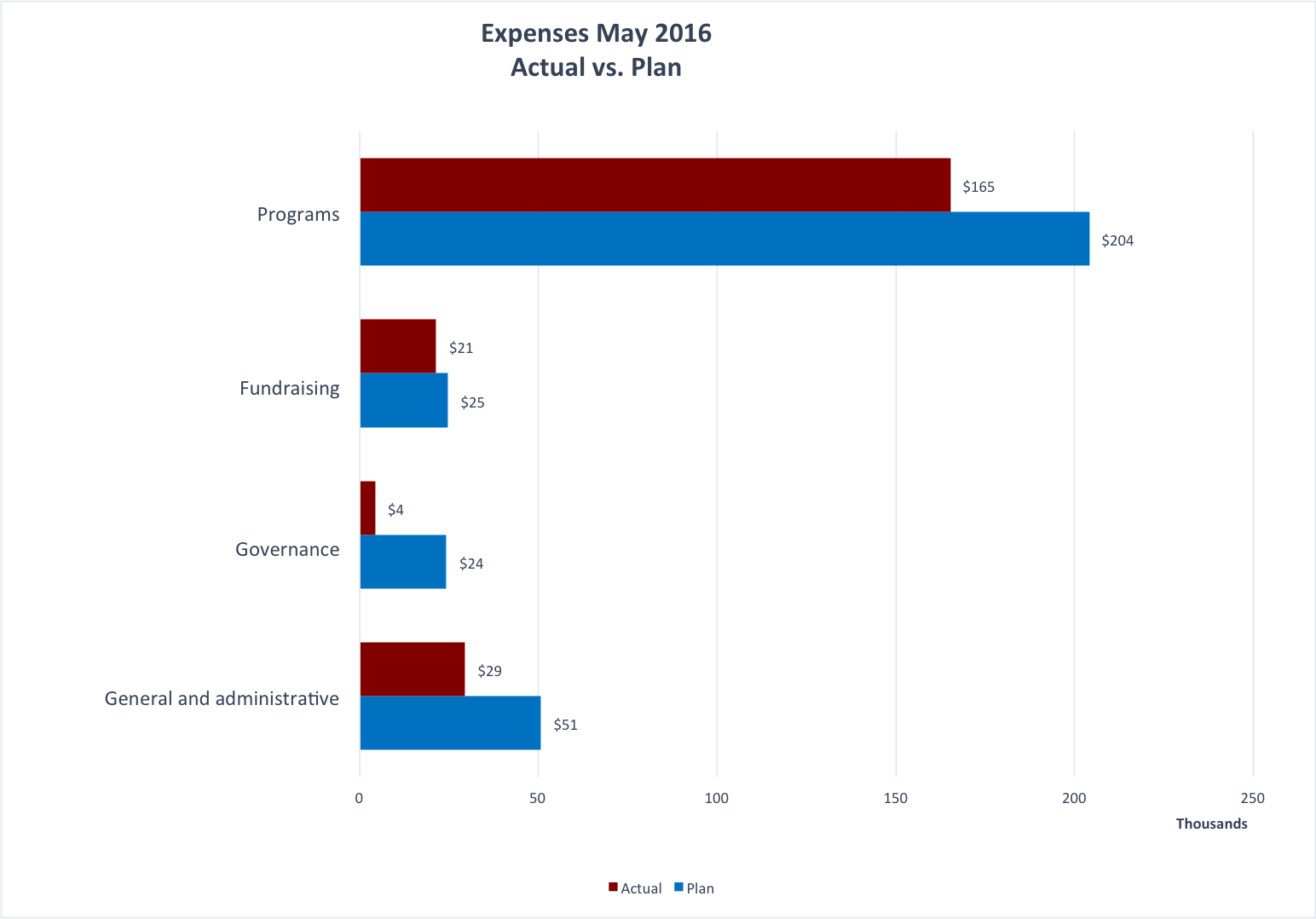
For the month of May expenses were $220,447 versus the plan of $303,407. The variance of $83k is primarily due to our decision to hold off on expanding our office space and staffing.
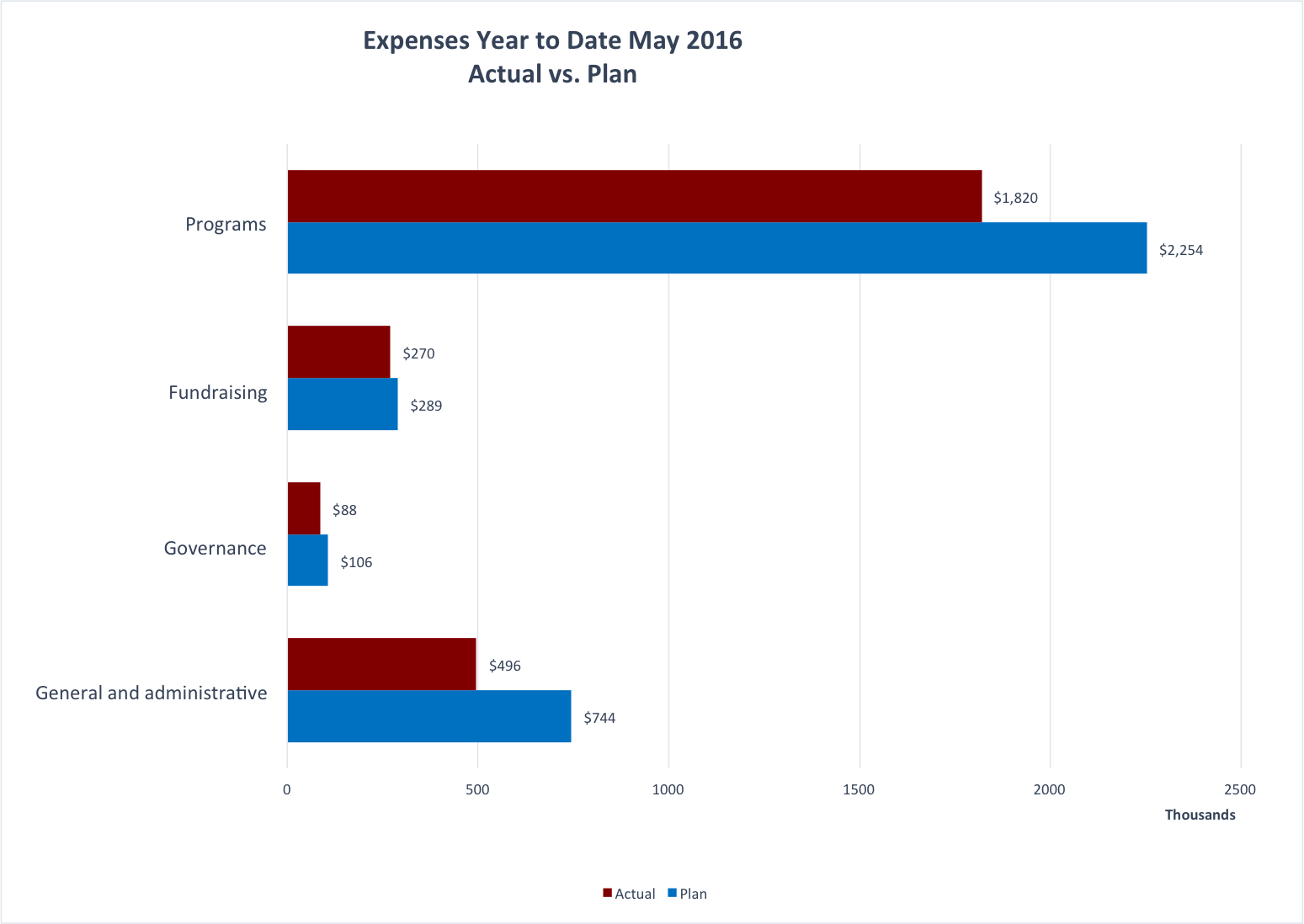
Our Year-To-Date expenses are $2,673,482 versus the plan of $3,394,241, resulting in a variance of $721k. Approximately 90% of the variance is due to holding back planned expenditures until long-term funding is secured. The remaining variance is a result of the timing of expenses.
Our spending level over the last 3 months has remained steady at 79% of our planned budget.
Fundraising
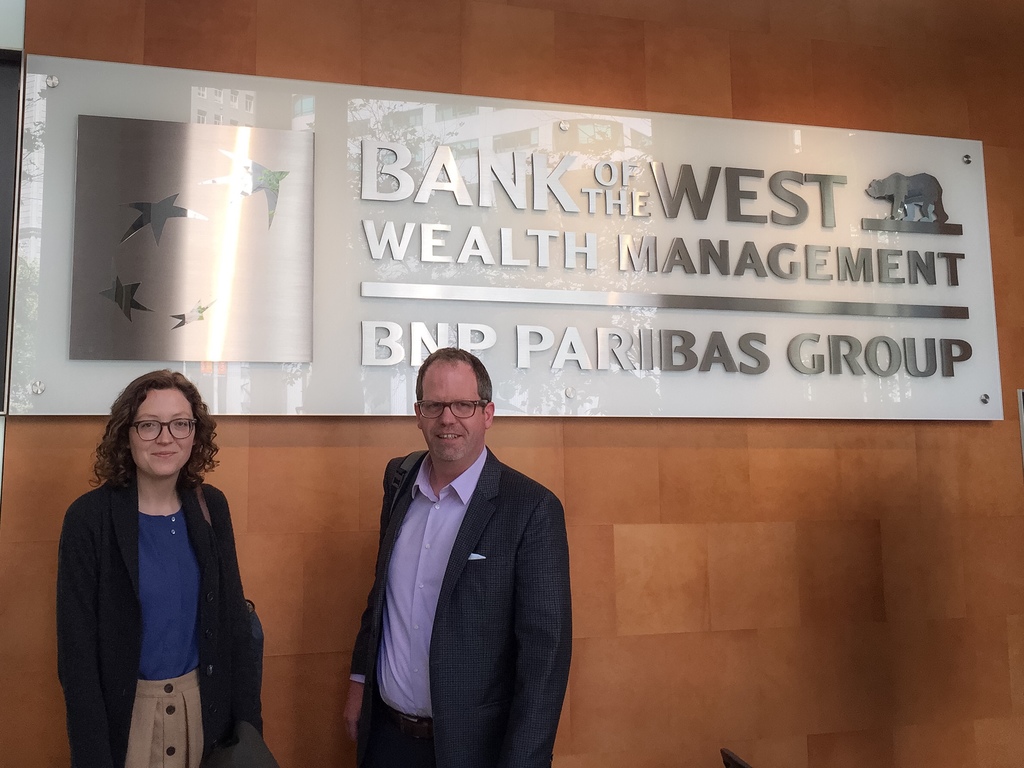
In May, Wiki Ed released a request for proposals for a major donor communication and activation campaign. Proposals are in review, and we anticipate a contract will be awarded in the near future. The campaign seeks to secure new major support for the organization from individuals.
To prepare for the campaign, the development team attended a Major Gifts workshop at the Foundation Center in San Francisco. Through Greg Boustead of the Simons Foundation, Senior Manager of Development Tom Porter secured introductions to foundations that are part of a STEM funders network. We hope that these valuable introductions from the Simons Foundation will help us earn new support for Wiki Ed.
On May 18, the development team held an FY17 tactical planning retreat. Bank of the West Wealth Management generously donated workspace in their downtown San Francisco office for this purpose. Outcomes of this meeting were first drafts of individual work plans, process maps, and timelines. The Development Committee of the Wiki Education Foundation Board met to approve drafts of three new policies for the department: the Gift Acceptance Policy, the Gifts-in-Kind Policy, and the Donor Bill of Rights.
Planning was also underway for a small donor cultivation event in Houston, Texas. Tom Porter was working closely with Wiki Education Foundation board chair Diana Strassmann, alongside board members Karen George and Karen Twitchell. This event was being held to leverage the outstanding Stanton Foundation challenge grant, which aims to activate the Wiki Education Foundation board in the development process. Wiki Ed received a $25,000 installment of our matching grant from the Stanton Foundation in May.
Office of the ED
Current priorities:
- Finalizing the annual planning and budgeting process for fiscal year 2016–17
- Supporting the fundraising team in securing funding
In May, Executive Director Frank Schulenburg sent the first version of the annual plan & budget for fiscal year 2016–17 to the board for review. The board provided valuable feedback on the document, which provided the basis for the second, improved version, which was sent to the board at the end of the month. Through an improved and more rigorous planning process, senior leadership was able to give the board more time to review and discuss the plan. The board will vote on the 2016–17 plan and budget during its meeting in Houston. Frank also attended board committee meetings and supported board chair Diana Strassmann in planning the meeting in Houston.
Frank began working with Melissa Ganus (User:DrMel), who has taken the lead on planning and organizing WikiConference USA 2016. This year, WikiCon USA will be hosted at the San Diego Public Library in early October. Frank acted as an advisor to Melissa on topics ranging from conference goals to potential options for raising funds.
Visitors and guests
- Cecelia Musselman, Northeastern University
